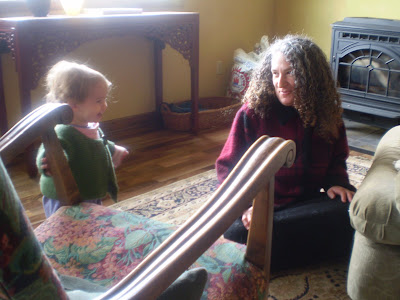This year we will be here in NJ for the seders and then ND and I are flying to Portland. (Sadly it's a quick visit, so very little time to see friends... if you are a Portland friend and I have not contacted you.)
The second seder will be at the rabbi's house and he has asked participants to prepare different parts to contribute. As usual, I am taking this very seriously (much Too seriously) and am totally psyched about the challenge of putting together a mini-drash.

1. One thing I want to do is about my
etrog basket. At school last week I was reading to the children from
Passover Around The World (written by a woman I met at our shul last year at Pesach). We read that the Jews of Gibralter save their lulavim from Sukkot and, six months later, burn it as fuel to make matzot before Pesach. This led to my sharing with my students about how I have used lulavim and about turning an object of a mitzvah into something else. (Many of these kids have seen very little handmade art by people they know.)
When I showed it to my Hebrew counterpart at school (the woman who teaches the Hebrew/Judaic half of the day to my students), she held it with all the respect and love of a person who understands art done from the heart. She told the children it was like the basket that carried Moshe (Moses) when he was a baby.
So I'm hoping to bring the basket and talk about it a little. One thought is that the basket was created from lulavim, significant because later in the Pesach story, the Jews will be in the desert and will create Sukkot. But this basic to carry Moshe, is at the beginning of the story. There is a timeless chronology, a which-came-first feeling to it. Kind of cool.

2. The makot (plagues). The Rabbi asked me to talk about modern day plagues, but I want to do plagues in a different way instead. I'm going to go with Nile vs. Rainfall theme I think since it's relevant to my latest meditative goals. I'm taking many of these ideas from articles I read about Pesach on the Chabad website, particularly that of
Yanki TauberMany of the plagues originate from the river. I would say most importantly are the first two, the blood and frogs. The Egyptians got everything they needed from the river as it was such an agriculturally based society. When they needed water, they took it... to drink, to water crops etc. Even the cows, symbolic of years of plenty within Pharoah's dream during the story of Joseph, come from the Nile.
When Hashem essentially poisons the water with blood, G-d is showing symbolically what good has come of Egypt's wealth -- the oppression of others -- and is also weaning the Jews off their need and/or desire for the river. They need to be prepared in the dessert and later in Israel, as well as here in our time and place, to receive everything (including rain) from Hashem.
It seems to me that the plagues actually have an upward progression:
They begin at your feet, literally water level.
Then they leap up in the form of frogs all over your body.
Then there is an invasion below the skin with lice.
Then wild animals come and threaten real bodily harm.
And then the Egyptians animals, their means of economic survival, are killed by epidemic, a silent killer.
Another silent invader comes as boils appear on their skin from nowhere.
Then hail from above.
Locusts from above and everywhere else too.
Complete and total darkness. All encompassing. Like depression both inside and outside your soul.
And then most devastating of all, death of the First-Born, the very future is now at risk.
In our time, when we are faced with severe trials, people often try to find ways to surrender themselves to Hashem. You can fight the event or no reality, but it will only tear you up inside. Through all of that pain, eventual acceptance of your situation is ultimately comforting for most people. Though these plagues are aimed at the Egyptians, not the Jews, it is training for both to realize that Hashem is in charge and that bitachon, or trust in G-d, is a path we're being asked to take.
I admit I find this very difficult. If something REALLY bad happened, I would much rather fight with G-d. But I also know that it would probably ultimately kill me to do it if I didn't eventually accept whatever happened as being Hashem's will and that Hashem's will is ultimately good.
In the meantime, while (thank G-d!!!!) nothing horrific is presenting itself to me at the moment, I just want to remember through daily practice that Hashem sends all that is good as well.
The final challenge of course is what to think about situations that are neither mine to accept nor to change. Genocide in Darfur would be a good example. So would much of the hunger in the world that has increased in the last few weeks. If I'm not the one suffering, I have no right to "accept" what Hashem is allowing. And as a teacher in New Jersey, I can sign a petition or two, but that's it.
So though I have a few meek semi-answers to this, the question is better left unanswered.
Labels: holidays, Judaism, living here, meditation, rituals










